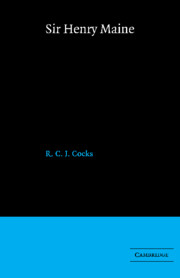1 - THE EARLY THOUGHTS ABOUT LAW
Published online by Cambridge University Press: 29 September 2009
Summary
SOURCES AND THEMES
Maine's jurisprudence was characterised by reasoning which began with the analysis of non-legal phenomena and arrived, ultimately, at conclusions about law. For example, observations on the political role of ‘public opinion’ in social change were used to explore the best methods of legal reform. Thoughts about the history of language were the means to dispute theories which claimed that law could be understood independently of social phenomena. Anthropological observations on societies, both past and present, were used in the course of arguments designed to reveal the inadequacies of theories of natural law. To take a more specific example, the argument that progressive legal change required a movement from status to contract was never presented by Maine as if it was a necessary truth about law. Instead the nature of the change was revealed by numerous historical investigations; in Ancient Law Maine only presents the argument about status and contract at the end of his fifth chapter.
There is an almost bewildering variety of topics in his work. It seems that he was prepared to discuss any subject.
- Type
- Chapter
- Information
- Sir Henry MaineA Study in Victorian Jurisprudence, pp. 13 - 38Publisher: Cambridge University PressPrint publication year: 1988



